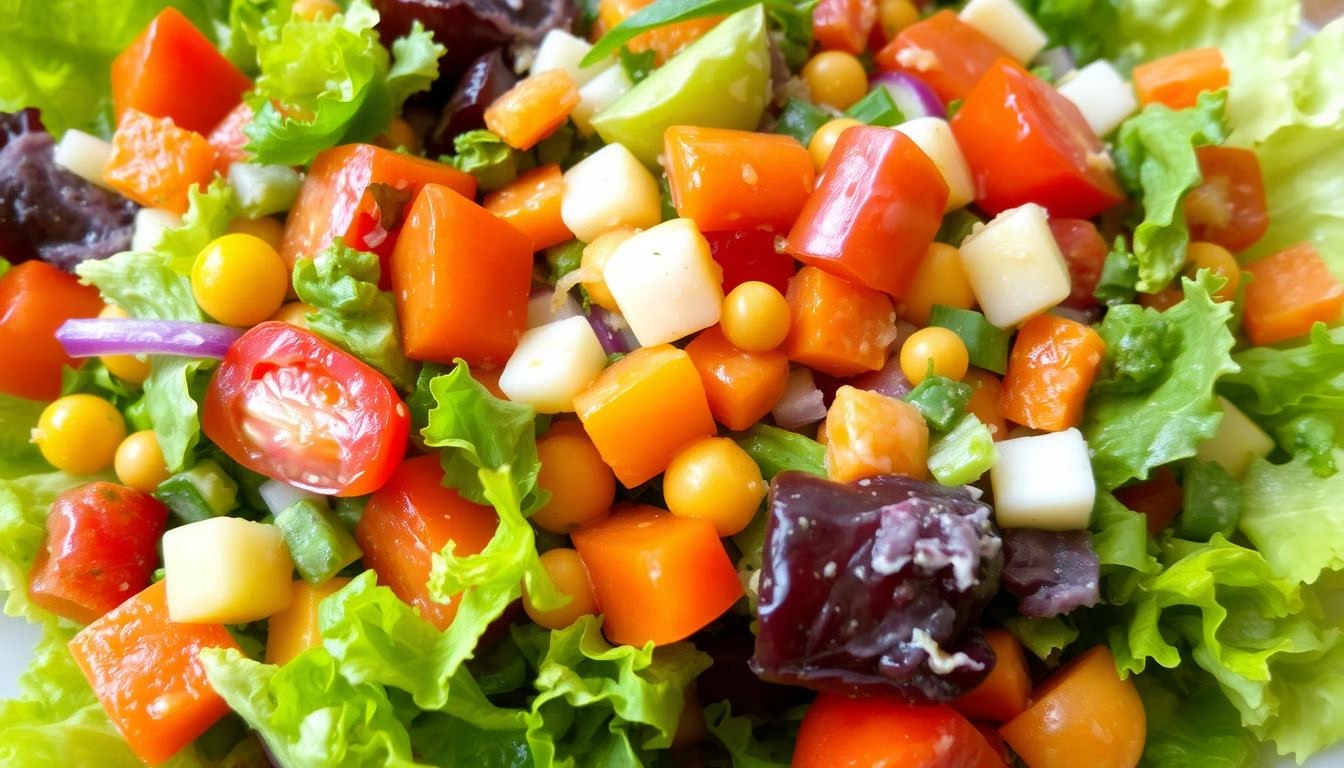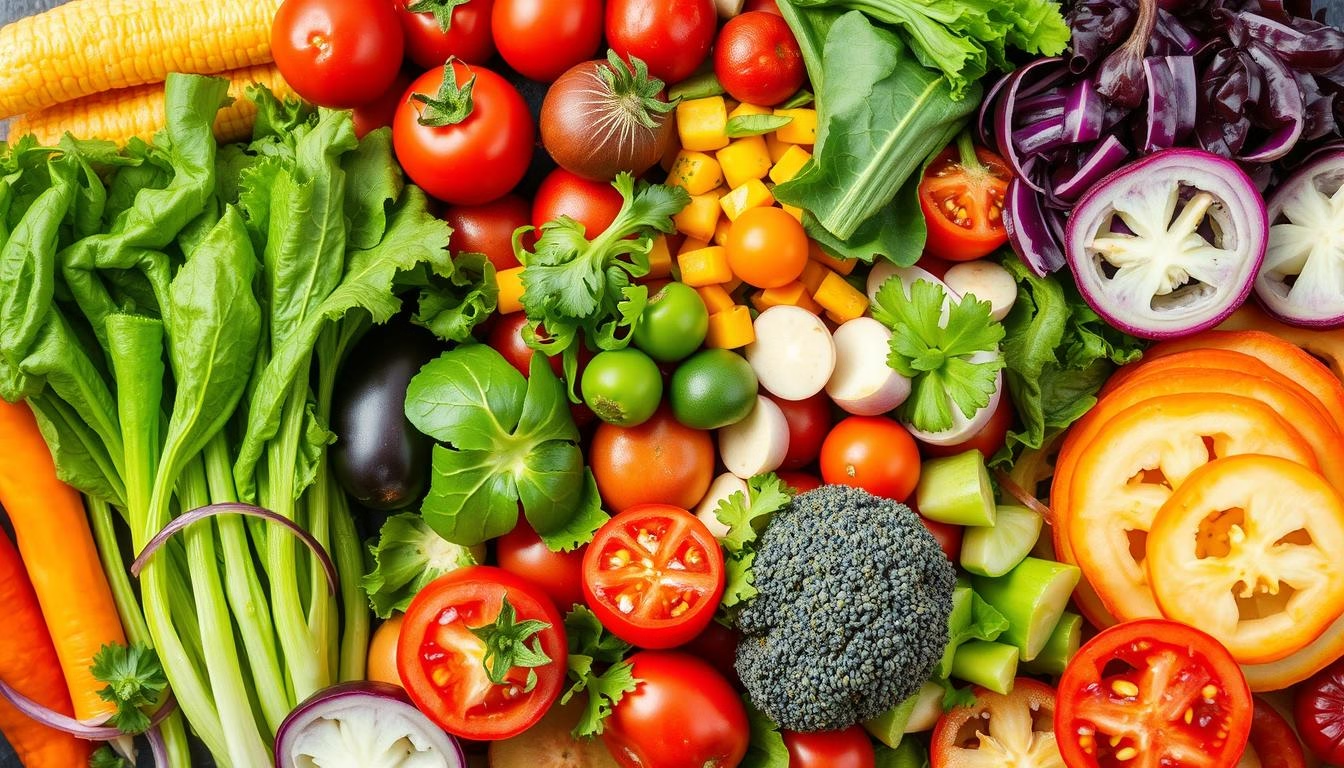My how-to guide reveals the top advantages of a vegetable salad and provides a simple recipe for creating the perfect one.

Vibrant and lush vegetable salad, overflowing with a variety of fresh produce, including crisp lettuce, juicy tomatoes, crunchy carrots, and a rainbow of other veggies. The salad is beautifully arranged, showcasing the natural colors and textures of the ingredients. A light, healthy dressing adds a subtle touch of flavor, enhancing the overall freshness and appeal of the dish.
Reflecting on my journey to a healthier lifestyle, I’ve learned the value of vegetable salads. They are packed with vitamins and minerals, helping with weight management. This article will explore the benefits of vegetable salads, including their role in a healthy diet.
Key Takeaways
- Regularly eating vegetable salads can lower the risk of serious health issues like cancer and heart disease.
- Vegetable salads are full of vitamins and minerals, including vitamin A, vitamin C, and folate.
- Starting with a green salad can make you feel full and help you eat fewer calories.
- Adding healthy fats like olive oil and avocado boosts the absorption of beneficial phytochemicals.
- Vegetable salads help keep you hydrated, supporting skin health and weight management.
- Eating leafy greens daily can make you feel mentally younger, like being 11 years younger.
Power of Vegetable Salads in Modern Nutrition
Vegetable salads are key in modern nutrition. They are packed with vitamins, minerals, and antioxidants. This makes them a great choice for a healthy diet.
These salads offer a lot of vegetable salad nutrition. They are rich in vitamins A and C, potassium, and fiber. Eating more fruits and veggies can lower heart disease risk by up to 4% daily.
The Evolution of Salad as a Dietary Staple
Salads have changed a lot over time. Now, they’re a mix of greens, veggies, lean proteins, and healthy fats. This mix helps with weight control and boosts health.
Why I Recommend Vegetable Salads for Overall Health
Vegetable salads are full of health benefits. They help prevent chronic diseases and aid digestion. With so many veggies to choose from, you can make a salad that tastes great and is good for you.
Key Components of a Nutritious Vegetable Salad
A good vegetable salad has a few key ingredients:
- Leafy greens, such as lettuce and spinach
- Colorful vegetables, like bell peppers and carrots
- Lean proteins, including chicken and tofu
- Healthy fats, such as nuts and seeds
These ingredients make a salad that’s full of nutrients. They support your health and well-being.
| Ingredient | Nutritional Benefit |
|---|---|
| Leafy Greens | Rich in vitamins A and C, potassium, and fiber |
| Colorful Vegetables | High in antioxidants and essential minerals |
| Lean Proteins | Supports healthy muscle growth and maintenance |
| Healthy Fats | Provides sustained energy and supports heart health |
The Best Advantages of Vegetable Salad for Your Health
Eating a healthy vegetable salad offers many health benefits. It provides essential fiber and antioxidants. These benefits help with weight management and reduce constipation risk.
A high-fiber diet makes you feel full longer. This helps you eat less, which is a key benefit of vegetable salads.
Some of the benefits of a healthy vegetable salad include:
- Lower cholesterol levels
- Prevention of constipation
- Feeling fuller and eating less
Incorporating a healthy vegetable salad into your diet has many health advantages. It’s a great addition to your daily meals. Many people choose it to improve their health and well-being.
| Vegetable | Fiber Content | Antioxidant Level |
|---|---|---|
| Lettuce | 1.2 grams per 100g | High |
| Spinach | 2.5 grams per 100g | Very High |
Essential Nutrients Found in Vegetable Salads
Vegetable salads are packed with vitamins, minerals, fiber, and antioxidants. The vegetable salad nutrition facts reveal that dark leafy greens and colorful veggies offer a variety of nutrients. These veggies are also full of antioxidants, which bring many vegetable salad health benefits.
A balanced vegetable salad is rich in fiber, vitamins, and minerals. Key nutrients include:
- Vitamin K: found in spinach, broccoli, and other leafy greens
- Vitamin C: found in broccoli, tomatoes, and other brightly colored vegetables
- Potassium: found in beets, tomatoes, and other vegetables
- Fiber: found in peas, carrots, and other vegetables
Vegetable salads also have antioxidants like carotenoids and sulforaphane. These help reduce inflammation and improve heart health.
The vegetable salad nutrition facts highlight their value in a healthy diet. They are full of vitamins, minerals, fiber, and antioxidants. This makes them a great choice for many vegetable salad health benefits and nutritional benefits of vegetable salad.
| Vegetable | Calories per cup | Nutritional benefits |
|---|---|---|
| Spinach | 6.9 | Rich in vitamin K and iron |
| Broccoli | 30.9 | High in vitamin C and fiber |
| Carrots | 52.5 | Rich in vitamin A and fiber |
Weight Management Benefits of Regular Salad Consumption
Eating vegetable salads regularly can help with weight management. They make you feel full and help you eat less, which can lead to weight loss. Vegetable salads are good for you because they are full of nutrients, fiber, and water. This makes them perfect for a weight loss diet.
There are many benefits to adding vegetable salads to your diet. They can help you feel less hungry and more full, making it easier to follow a weight loss plan. The high fiber in vegetable salads also helps you feel full longer and prevents overeating. Some key benefits include:
- Low calorie density, making it easier to reduce daily calorie intake
- High fiber content, which can help reduce hunger and increase feelings of fullness
- Rich in essential vitamins and minerals, supporting overall health and well-being
Adding vegetable salads to your diet can greatly benefit your weight management and overall health. By making simple changes, like adding a salad to your meals, you can enjoy the benefits. This can help you reach your weight loss goals.
How Vegetable Salads Boost Your Immune System
Vegetable salads are a great way to boost your immune system. They are full of phytochemicals and antioxidants. These nutrients make them a great addition to a healthy diet.
Some key ingredients in vegetable salads include:
- Dark leafy greens like kale and spinach, rich in vitamins A, C, and K
- Cruciferous vegetables like broccoli and cauliflower, high in fiber and vitamins
- Tomatoes, which supply vitamin C, lycopene, and potassium
These salads do more than just boost your immune system. They also help your heart and can aid in weight management. By adding different vegetables to your salad, you get a nutritious and tasty meal.
Seasonal choices can also enhance your salad’s benefits. Picking ingredients in season means your salad is not only tasty but also full of nutrients. Salads are high in water and fiber, helping with hydration and digestion. They’re a great choice for boosting your immune system and overall health.
| Ingredient | Nutritional Benefit |
|---|---|
| Leafy Greens | Rich in vitamins A, C, and K |
| Cruciferous Vegetables | High in fiber and vitamins |
| Tomatoes | Supply vitamin C, lycopene, and potassium |
Creating the Perfect Balance in Your Vegetable Salad

Here is a prompt you can use for Midjourney to create an image of a “nutrient-rich salad” based on the given information: “Vibrant, visually appealing vegetable salad with a variety of fresh, crisp greens, colorful tomatoes, cucumbers, bell peppers, and other nutrient-dense vegetables, arranged in a harmonious and balanced composition, garnished with delicate edible flowers, and drizzled with a light, tangy dressing, set against a clean, minimalist background.”
To make a nutrient-rich salad, balance your ingredients well. Start with a base of spinach, kale, or Romaine for a strong start. Almost 80 percent of people don’t eat enough fruits and veggies, making a balanced salad key for health.
When you make a vegetable salad, think about what it does for you. It keeps you full and gives you lots of nutrients. A good salad has greens or veggies, a protein, and carbs. Aim for 20 to 25 grams of protein, like from chicken or tofu.
- Choose the right base ingredients, such as leafy greens or vegetables
- Add a protein source, like chicken or tofu, to increase satiety
- Incorporate healthy dressing options, like vinaigrette or avocado-based dressings
Follow these tips to make a tasty and healthy salad. Balance your ingredients and add different foods for the best health benefits.
| Ingredient | Recommended Serving Size |
|---|---|
| Leafy Greens | 5-ounce container |
| Protein Source | 3 to 4 ounces |
| Healthy Fats | 1 to 1.5 ounces |
Meal Planning with Vegetable Salads
Exploring the benefits of vegetable salad in my diet has shown me the value of meal planning. Making my own vegetable salads lets me control what goes in and how much. This way, I can make sure I’m getting the nutrients I need for a healthy life.
Meal planning with vegetable salads saves me time and helps me avoid unhealthy foods. By making salads ahead of time, I dodge the temptation of fast food. It also helps me eat a balanced diet, with lots of veggies, healthy fats, and proteins. The nutritional benefits of vegetable salads are clear, and they make my meals better.
Some key benefits of meal planning with vegetable salads include:
- Increased nutrient intake
- Improved weight management
- Reduced food waste
- Save time and money
Adding vegetable salads to my meals has made my diet healthier and more balanced. The advantages of including vegetable salad in my diet are many. By making a few changes to my meal plan, I’ve seen my health and wellbeing improve. Whether I’m trying to lose weight, boost my energy, or just feel better, vegetable salads are a great choice.
Common Mistakes to Avoid When Preparing Vegetable Salads

Here are some prompts you can use with Midjourney to create an image of “vegetable salad benefits” without any textual or narrative characters: 1. Vibrant array of fresh, crisp vegetables arranged in a visually appealing composition 2. Delectable assortment of colorful, nutrient-dense veggies cascading across the frame 3. Lush, verdant display of leafy greens, crunchy roots, and juicy tomatoes overflowing the frame 4. Bountiful harvest of well-proportioned, glistening vegetable slices showcased in a modern, minimalist style 5. Tantalizing medley of raw, wholesome produce bursting with natural vitality and visual appeal
When making a healthy vegetable salad, it’s key to avoid common mistakes. One big error is not storing leafy greens right. They should be kept cold and rinsed well before use. This helps keep the salad full of nutrients.
Staying away from mistakes can make your salad better and healthier. Some errors include using bagged lettuce, which can get contaminated easily. Also, not adding enough protein can lead to more snacking. By avoiding these, you can make a salad that’s both tasty and good for you.
- Choose fresh and varied ingredients to maximize nutrient intake and enhance the healthy vegetable salad experience.
- Incorporate protein sources, such as nuts or seeds, to increase satiety levels and support overall health.
- Use homemade salad dressings, which are often made with fewer ingredients and can reduce calorie intake, to maintain the nutrient-rich salad benefits.
By following these tips and watching out for common mistakes, you can make a delicious and healthy vegetable salad. This salad will give you the health benefits you want and help you eat well.
My Signature Nutrient-Rich Vegetable Salad Recipe
I’m excited to share my favorite vegetable salad recipe. It’s packed with nutrients and offers many benefits. This salad is not only tasty but also full of good stuff for your body.
Choosing the right ingredients is key to a great salad. Start with mixed greens like spinach, kale, or Romaine. They’re full of vitamins and minerals. Then add colorful veggies like bell peppers, cucumbers, and cherry tomatoes. These are rich in antioxidants and fiber.
Here’s a simple salad recipe you can try:
- 2 cups mixed greens
- 1 cup cherry tomatoes, halved
- 1 cup sliced cucumbers
- 1/2 cup sliced red onion
- 1/4 cup croutons
- 2 tablespoons olive oil
- 1 tablespoon lemon juice
This salad is easy to make and full of nutrients. One serving has about 10g of carbs, 2g of protein, and 14g of fat. It’s also loaded with vitamins A and C, potassium, and fiber. It’s a great choice for a healthy meal.
| Nutrient | Amount per serving |
|---|---|
| Calories | 173 kcal |
| Carbohydrates | 10g |
| Protein | 2g |
| Fat | 14g |
| Fiber | 1g |
This salad is a great way to add more nutrients to your diet. It’s easy to make and perfect for a quick, healthy meal or snack.
Final Thoughts: Transforming Your Health with Daily Vegetable Salads
As we wrap up our look at vegetable salads, I’m sure you see their value. Adding these salads to your meals can change your life. They help with weight management and boost your immune system. They also give you important vitamins, minerals, and antioxidants.
It’s time to make vegetable salads a part of your daily life. Try new ingredients and use fresh, seasonal produce. You’ll find that these salads are not only good for you but also tasty.
Starting small is key to better health. Eating vegetable salads regularly can improve your health and mood. Let plant-based nutrition lead you to a healthier, happier life.
FAQ
What are the best advantages of including vegetable salad in my diet?
Vegetable salads are packed with vitamins, minerals, fiber, and antioxidants. They help with weight management, boost your immune system, and lower disease risk.
What are the key components of a nutritious vegetable salad?
A good salad has leafy greens, various veggies, protein, and a healthy dressing. The right mix of ingredients makes it nutritious and tasty.
How do vegetable salads support weight management?
Salads are low in calories but high in fiber. This makes you feel full and eat less. They help with weight control and overall health.
What nutrients are found in vegetable salads, and how do they benefit my health?
Salads are full of vitamins, minerals, fiber, and antioxidants. These nutrients improve digestion, boost immunity, and lower disease risk.
How can vegetable salads boost my immune system?
Salads have immune-boosting phytochemicals and antioxidants. Picking seasonal ingredients and balancing your salad boosts immunity.
What common mistakes should I avoid when preparing vegetable salads?
To keep your salad safe and healthy, follow storage and freshness tips. Also, use the right preparation methods.
Source Links
- https://mangia.nyc/is-eating-lots-of-salads-good/
- https://www.jencaremed.com/articles/5-reasons-eat-more-salads-recipes
- https://www.webmd.com/diet/health-benefits-of-salad-greens
- https://nutritionsource.hsph.harvard.edu/what-should-you-eat/vegetables-and-fruits/
- https://www.mdpi.com/2304-8158/13/22/3591
- https://extension.colostate.edu/topic-areas/nutrition-food-safety-health/health-benefits-and-safe-handling-of-salad-greens-9-373/
- https://www.circle-cafe.com/blog/benefits-of-eating-salads-in-dubai/
- https://www.medicalnewstoday.com/articles/323319
- https://www.vitaminexpert.co.uk/what-has-more-nutrition-vegetables-or-salad/
- https://www.eatingwell.com/article/8035429/is-salad-good-for-you/
- https://www.isayorganic.com/blogs/news/top-benefits-of-salads-you-should-know?srsltid=AfmBOooS16YTweBkdPkrM6EvMExBwu8_RT2Qnp9LHI7vjOEt5UfZNfev
- https://www.healthline.com/nutrition/salad-for-breakfast
- https://www.isayorganic.com/blogs/news/top-benefits-of-salads-you-should-know?srsltid=AfmBOorrkSANPI2zAM6zLl6d5q5QasjTXPr33e62vyPL3iJqB1UCL8eu
- https://saladflexi.com/top-10-health-benefits-of-eating-salad-every-day/
- https://greensalad.in/benefits-of-salad/
- https://www.self.com/story/make-a-salad-that-will-satisfy-you
- https://www.alittlenutrition.com/how-to-make-a-balanced-salad/
- https://www.ahealthysliceoflife.com/how-to-meal-prep-salads-and-keep-them-fresh/
- https://barefeetinthekitchen.com/how-to-eat-salad-every-day/
- https://blog.hungryroot.com/post/meal-planning-meal-prep-salads-perfect-way-to-eat-healthy-on-the-go
- https://www.thedailymeal.com/1308789/mistakes-you-need-avoid-when-making-salad/
- https://www.fitterfly.com/blog/how-to-make-a-healthy-salad-dos-donts/
- https://www.mashed.com/981929/mistakes-everyone-makes-when-making-salad/
- https://allyskitchen.com/anti-inflammatory-raw-veggie-salad/
- https://dizzybusyandhungry.com/summer-salad-fruit-and-veggies/
- https://www.homemadeinterest.com/mixed-green-salad/
- https://www.hintsrecipes.com/10-benefits-of-salad-why-you-should-eat-more/
- https://www.healthkart.com/connect/some-benefits-of-eating-salad-every-day/?srsltid=AfmBOorjlFD__Sj6QaPxLCDdinqBmdBxrNQWzd3imiFFAs4ON5pZ7Tqf
- https://thesaladboxeatery.com/blog/c/salads/b/is-it-ok-to-eat-salad-everyday
Blexza Blog | Global Fusion Blog | Urdu Global Fusion Blog | TrendNovaWorld Blog
With 16 a long time of involvement, Alex Carter is a prepared essayist specializing in different specialty subjects, counting wellbeing, fund, innovation, way of life, and more. Her substance is profoundly investigated, SEO-optimized, and supported by sound sources, guaranteeing per users pick up precise, quick, and locks in data over numerous domains.
📌 Mastery: In-Depth Investigate | SEO Substance | Multi-Niche Writing
